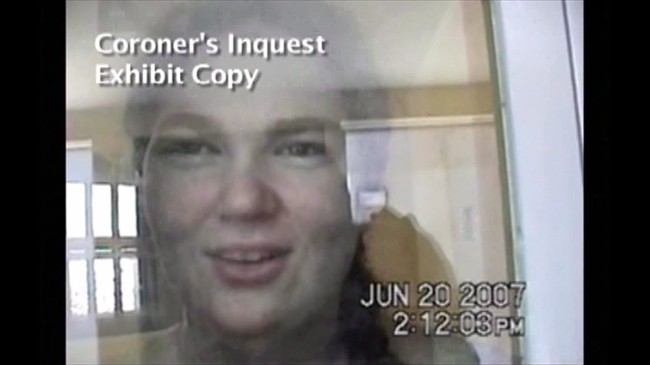OTTAWA – Almost a year after a provincial coroner’s inquest deemed her death a homicide, the Correctional Service of Canada is still refusing to release information about teenage inmate Ashley Smith.

The prison service has withheld almost 75 per cent of a 195-page response to Global News’ access-to-information request about instructions given to prison guards on entering Smith’s cell. Smith choked herself to death while guards watched on Oct. 19, 2007 at Grand Valley Institution for Women in Kitchener, Ont.
The government cites privacy law, “irrelevance” and duplication as reasons for censoring entire pages of documents.
Even within the 50-odd pages released, much of the information is redacted or repeated.
READ MORE: Years after Ashley Smith death, little action for women inmates
A management plan crafted for Smith in the weeks leading up to her death is blacked out, save for some additional “observation measures.”
What remains suggests prison staff members, known as “primary workers” in women’s prisons, were aware of Smith’s self-harming behaviour and under strict instructions from wardens to observe and restrain the troubled 19-year-old inmate using handcuffs, leg irons or lead chains – but not to interact with her.
The documents say the prison warden “has final approval on all changes to this plan.”
Information ‘inadvertently not provided’
Most of the documents are signed off by acting warden Cindy Berry – whom CSC fired, and then quietly rehired, following Smith’s death in custody. Barry McGinnis, a former assistant warden who no longer works at the prison but is still employed by CSC, also signed some of the instructions.
CSC spokesman Jon Schofield said in an email that information requests are processed in accordance with the Access to Information and Privacy Acts. He said the CSC cannot comment on the circumstances or specific details about an individual’s employment for privacy reasons.
Global News made the initial request for documents in March 2013 – almost 1.5 years ago.
Federal corrections initially denied the request, citing the Ontario provincial coroner’s inquest into Smith’s death. But a provincial representative quickly debunked that claim, telling Global it was “ridiculous” and that CSC was using the inquest as an excuse not to release information.
Last November, the inquest ruled Smith’s death a homicide and made more than 100 recommendations, including limiting segregation to 30 days. The government says it will respond to these in December.
The government released documents to Global News on May 28, 2014, after a formal complaint was filed with the information commissioner in spring 2013. But that information simply cited publicly-available commissioner’s directives printed from Corrections Canada’s website.
Following a further complaint, the government said the correct information “was inadvertently not provided,” and released the 195-page redacted response on Aug. 12.
The information documents the final weeks of Smith’s life, although most of the information is blacked out.
WATCH: Ashley Smith’s family calls for reopened criminal investigation in her death
An “immediate action plan” crafted on Aug. 31, 2007 – fewer than two months before Smith died – shows the initial response to Smith’s chronic choking and cutting focused on security measures, not psychology.
“This plan is to be used in the instance of continual attempts of self-harm or suicide attempts where there is belief that the offender will suffer grievous bodily harm or lose (sic) of life,” it says.
“Primary Workers (PW) MUST order the offender to cease and desist the behaviour that is causing the grievous bodily harm.”
It goes on to say the offender will be restrained and male workers must be replaced with female workers as soon as possible. “If an offender is nude then a blanket must be used to cover her up,” it says.
After the restraining, the document says: “Once approval is received the on-call nurse will need to be contacted.”
The CSC cites three sections of the access to information law in its refusal to release records:
- 16 (1) (d): information could be injurious to the security of penal institutions;
- 19 (1): records requested contain personal information
- 21 (1) (b): an account of consultations or deliberations in which directors, officers or employees of a government institution, a minister of the Crown or the staff of a minister participate.
Smith’s name is mostly redacted from the documents, but not consistently. A note from Sept. 21, 2007 reads, “Effective Ms. Smith’s return from Outside Hospital.”
An investigator from the information commissioner’s office says he will be seeking further justification from the department as to why the documents were redacted.



Comments